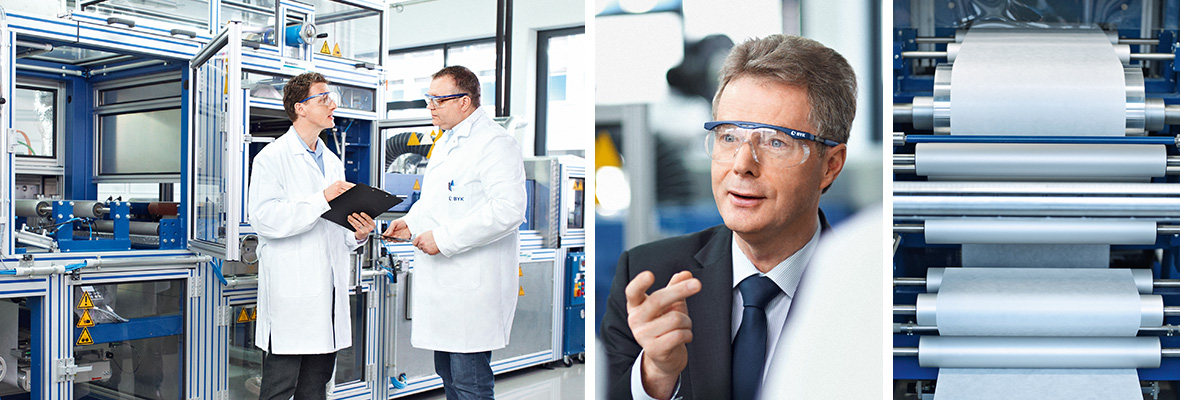Experts call it spread coating, and this procedure packs a punch. It is used to spread millimeter-thin layers of PVC plastisol on a substrate at extremely high speeds and to subsequently print something on the new surface and lacquer it. The facilities needed for this process can be more than 500 meters long. They can produce, for example, 30 meters of flooring or 100 meters of wallpaper per minute, depending on the branch of industry.
It is not only the speed that poses a great challenge. The PVC material itself has its pitfalls. Like ketchup, the viscous mass flows very unevenly. To make the flow behavior predictable, manufacturers add so-called rheology additives. But how much of which rheology additive is compatible with the respective plastisol formulation?
A new, unique measuring method developed by BYK provides an answer. “The values obtained offer our customers production security,” says Martin Fischer, Manager PVC / Leather Additives.
Production-like Conditions
Viscosity measurements have long been commonplace in the industry. But as precise as the different established procedures are, they all have a big disadvantage: While they provide snapshots of the behavior of the plastic under certain conditions, they do not reflect actual production conditions with the high speeds and the forces that are generated.
“ But that’s exactly what we need,” thought Fischer. “Measurement values that reflect actual practice, in production-like conditions.”
But how can a chemical company obtain these values? Application manager Fischer, a trained chemical engineer with experience in mechanical engineering, came up with an answer: BYK has to simulate the processes of plastics processors in the lab. To do so, BYK needed its own coating facility, in miniature, but enabling the production processes to be emulated.
A Crazy Idea? Perhaps …
… but the management approved the investment. And Fischer started planning. In 2013, BYK began operating its own eight-meter-long spread coating facility.
It contains everything, on a smaller scale, that is used to produce flooring, wallpaper, and synthetic leather: an unwind, a coating head, goods contouring control, drum gelatinization, lamination, a dryer, and a double reel. And this is coupled with sophisticated measuring technology.
With this facility, the flow behavior of thePVC mass can be measured at different roller speeds and coating widths. On this basis, the experts at BYK determine the optimum dosage of the rheology additive for the respective formulation.
In addition, the facility enables the experts to check other settings. For example, the profile and angle of the knives that spread the plastisol on the substrate can be adjusted to prevent drops from forming on the knife, which can lead to imperfections on the coating.
The new measuring concept has gone down well. PVC manufacturers and processors from all over the world are making use of the service in Wesel and having their individual applications tested. Why? “Because with our method they can comprehensively simulate their production processes and thus optimize them,” says Martin Fischer.
